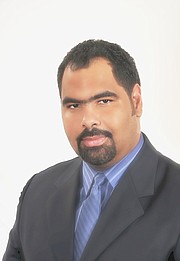By YOURI KEMP
Tribune Business Reporter
ykemp@tribunemedia.net
The Bahamas needs a tax structure that will attract the equivalent of 7m tourists to its financial services industry, a local banker argued yesterday.
Gowon Bowe, Fidelity Bank (Bahamas) chief financial officer, told a webinar organised by the Chartered Financial Analysts (CFA) Society of The Bahamas that it was impossible for this nation to abandon tourism because the sheer volume of visitors it attracts produces the “very large marketplace” needed to support the rest of the economy.
“When we start thinking about what we want in terms of diversifying the economy and moving away from tourism, we need to look at how we complement tourism, because that is an opportunity for access to a very large marketplace,” he explained.
“But secondly, we need to be thinking about industries that can sell to that same number of individuals in order to generate foreign currency earnings here. Financial services did provide that, and what we didn’t do previously - even though it was fortuitous for us and it created a middle class, and it created an opportunity for individuals to make some money - we never appreciated that actually financial services complemented a very large number of large things we were working in.
“So second home ownership, only now we see that financial services in terms of permanent residency and passports. It has long been an attractor of persons coming into the country, investing in home ownership, investing into the country and actually contributing to the local economies.”
Mr Bowe continued: “Secondly, we didn’t see it as relationship building, where we had some of the economic giants from Europe that used to reside in The Bahamas as heads of these organisations, and how do we leverage the relationships that we had.
“The opportunities for financial services, I think, are very clear for The Bahamas, but it is the implementation that has been difficult. Ultimately, the high net worth individuals will continue to have high net wealth, and the need for tax management and tax planning has not subsided. It is going to continue to be necessary.
“We have to start thinking about creating a tax policy environment that is going to allow us to attract 5-7m consumers in our financial services industry. What numbers we had in the past will be nowhere near that level, but when you talk about diversifying we have to stop seeing the borders that are The Bahamas and simply focus our attention on every market in the world being open to us.”
Larry Gibson, vice-president of Colonial Pension Services (Bahamas), who moderated the webinar, agreed that The Bahamas’ tax structure was no longer fit for financial services’ purpose.
“Our current tax policy has probably spent its useful course 10-15 years ago,” he said.
Kevin Burrows, founder of Diomedea Capital Advisors, told the webinar: “We are forced to look inward, and in The Bahamas I think we are behind the curve compared to Jamaica. Jamaica has a much more stronger, homegrown investment culture than we do.
“The Jamaican stock market has been booming for years, and participation in their stock market is widespread. It has created really strong and really talented homegrown, domestic, Jamaican asset managers who are now looking to expand throughout the Caribbean.
“In the Bahamas we need to get off of our high horse, so to speak, vis-à-vis the rest of the Caribbean and get in on that game.”
Explaining that he now focuses on regional projects within the Caribbean, Mr Burrows said there are “economies of scale. There is a lot of capital that is coming into the region, and we are eminently qualified to deal with that capital ourselves,” he added.
“We have the on-the-ground knowledge, so should someone in New York or London be directing investments into the Caribbean? No. That should be done out of The Bahamas, and out of Jamaica and out of Barbados.
“We need to get our swagger back and say we are as qualified as they are, plus we have intimate knowledge of what is needed on the ground and as much knowledge as the person sitting in New York.”





Comments
Use the comment form below to begin a discussion about this content.
Sign in to comment
OpenID